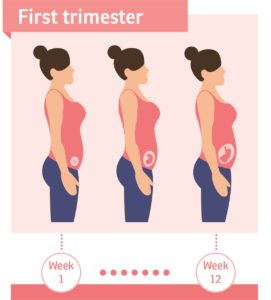From the moment you get the news that you are pregnant, you will probably be filled with a rush of emotions – and most likely a flood of questions too. While the first trimester of pregnancy is filled with a host of changes for you and for your baby, many will be invisible to the outside world.
WHAT IS THE FIRST TRIMESTER?
A full-term pregnancy lasts around 9 months, and most people (including your doctors and midwives) will break this up into 3 ‘trimesters’. Although you are pregnant from the moment of conception – when a male sperm fertilises your ovum (egg) – the first trimester of pregnancy is counted from the first day of your last period through to week 12. This is because most women who conceive naturally won’t know the date of conception.
Trimesters are a helpful way to think about pregnancy because the changes that happen to you and your baby fall into the 3 broad categories of early, middle and late pregnancy, called first, second and third trimesters.
WHAT HAPPENS TO YOUR BODY?
For some women, the first trimester is characterised by nausea (often called ‘morning sickness’, although it can occur at any time of day). But remember that every pregnancy is different and while some women have food cravings, others experience food aversions, and some have no change in appetite at all.
Other changes in the first trimester include changes to your breasts as they become tender, larger and heavier, while your uterus will grow and put pressure on your bladder so that you need to urinate more often.

YOUR EMOTIONS
You might feel a range of emotions during your first trimester. Hormone changes may make you feel moody or irritable, and tiredness is common in the early months. These feelings are normal, so discuss how you feel with your partner or with a close friend. If you feel down or anxious, speak with your doctor or midwife.
WHAT HAPPENS TO THE BABY?
Through the first trimester, your baby goes from being a fertilised ovum to a foetus of about 6cm in length at 12 weeks. By the end of the first trimester, your baby’s heart is starting to beat, and the brain, stomach and intestines are developing. There are little bumps known as ‘buds’ where arms and legs are starting to grow.
WHAT CAN BE EXPECTED FROM THE DOCTOR AND MIDWIFE?
Your antenatal (pregnancy) health checks might be with your General Practitioner, a midwife or an obstetrician, depending on where you will give birth. During your first antenatal health check, you will probably have your pregnancy confirmed with a urine or blood test. These are more reliable than home pregnancy tests. First trimester antenatal health checks usually happen every 4 to 6 weeks, but this can vary, based on your health and how your baby develops.
Many women are offered an ultrasound scan at around 12 weeks – you might hear the baby’s heartbeat at this scan. This ultrasound will also show if you are having a multiple birth (e.g. twins) and can help estimate the baby’s size and due date, as well as check for some health conditions.
Other health checks during the first trimester include:
- URINE TESTS: To detect urinary infections, a common but manageable condition that if left untreated can trigger pre-term labour
- BLOOD TESTS: To check your blood type (particularly Rh status), iron levels, blood sugars (for gestational diabetes), rubella (German measles) immunity, and other infections such as HIV, hepatitis B and syphilis
- GENERAL MATERNAL HEALTH AND WELLBEING CHECKS: Including a discussion of concerns you might have about your pregnancy or general health, and a medication review (including natural or alternative medicines) to check for safety during pregnancy
HOW TO STAY HEALTHY
Staying healthy is doubly important during pregnancy. If you are a smoker, this is a great time to quit – speak with your doctor or pharmacist for support.
It is safest not to drink any alcohol while you are pregnant, since even low-level drinking, particularly in the first trimester of pregnancy, can have long-term negative effects on your baby.
Try to eat a variety of nutritious foods during pregnancy since this will help meet your baby’s nutritional requirements, as well as your own. While the amount of food you need to eat during your first trimester won’t increase by much, you will need more of some nutrients. Most women will also need folic acid and iodine supplements because it’s difficult to get enough of these from food alone.
It’s important to keep up regular physical activity during your pregnancy because of the many benefits both for you and your baby. If you experience any discomfort or complications, speak to your doctor or midwife.
THINGS TO CONSIDER IN THE FIRST TRIMESTER
- Important for tracking your health and your baby’s growth.
- Get support – ask your partner, a friend or a family member to go with you to health checks.
- Are your vaccinations up to date? Immunisation is important. In Ghana tetanus vaccination is important to prevent neonatal tetanus.
- Your doctor or midwife can help you access a range of support services, not just for medical concerns – for example, if you feel you are at risk of violence or you are feeling vulnerable during your pregnancy.
SOURCE: https://www.pregnancybirthbaby.org.au
Click here to continue to the Second Trimester
